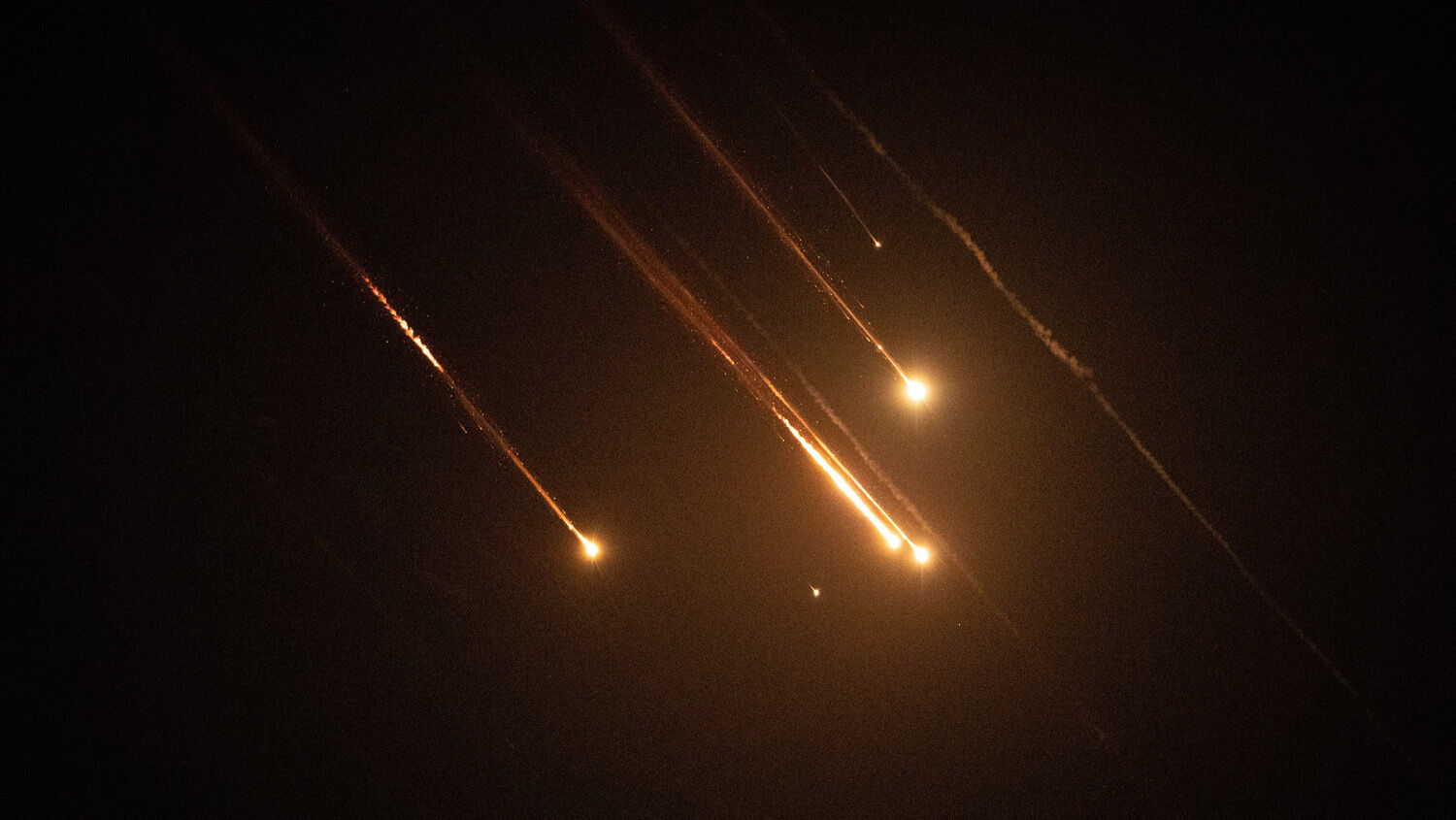
Iran Attacks Israel With Largest-Ever Ballistic Missile Strike
Iran launched a massive salvo of ballistic missiles at Israel on October 1, forcing nearly 10 million people into bomb shelters as rockets lit up the night sky and 1,800 sirens sounded across the nation.
Israeli officials say 181 missiles were launched in the attack, making it the largest ballistic missile strike in history. Most of the rockets were intercepted by Israel’s Iron Dome defense system and exploded in midair.
The Islamic Revolutionary Guard Corps (irgc) said the attack was launched in response to the killing of Iranian Brig. Gen. Abbas Nilforoushan and Hezbollah leader Hassan Nasrallah. They said any retaliation would be met with “further crushing and destructive acts.”
Several of Israel’s military bases were targeted, including the headquarters of the Mossad, Israel’s foreign spy agency. The Nevatim base in the Negev Desert was also targeted and hit, according to United States officials, but minor damage occurred.
Missiles also fell on multiple civilian sites, and at least one landed in a residential neighborhood in Jordan. A Palestinian man from Gaza was killed in the town of Jericho in the West Bank, and two Israelis were injured by falling shrapnel.
“Iran made a big mistake tonight, and it will have to pay for it,” Israeli Prime Minister Benjamin Netanyahu said in a video address following the attack. He continued:
The regime in Iran does not understand our determination to defend ourselves and our resolve to retaliate against our enemies. … They will understand. We will stand by the principle we have set: Whoever attacks us, we will attack them.
Rear Adm. Daniel Hagari, Israel Defense Force spokesman, also released a statement:
We will defend the citizens of the State of Israel. This attack will have consequences. We have plans, and we will operate at the place and time we decide.
Another senior Israeli official said, “Iran has declared war directly on the State of Israel.”
The U.S. supports Israel’s right to defend itself. In a press briefing at the White House, U.S. National Security Adviser Jake Sullivan said, “We have made clear that there will be consequences, severe consequences, for this attack, and we will work with Israel to make that the case.”
In the meantime, Israel has moved forward with its ground invasion into Lebanon and has launched strikes against Hezbollah, Iran’s proxy regime. On Thursday, Israel launched multiple air strikes into Beirut, Lebanon, targeting the terrorist group’s facilities, including its intelligence headquarters.
Iran continues to stir up animosity against Israel. As rockets rained down on Israel on Tuesday, many Palestinians celebrated.
Terrorist Attack Kills Seven
In addition to the historic rocket barrage, Israel also suffered one of the deadliest terrorist attacks it has had in recent years.
About 40 minutes before rocket sirens began to sound, two Palestinian terrorists from the West Bank carried out a shooting and stabbing attack at a light-rail station on Jaffa’s Jerusalem Boulevard in Tel Aviv. Seven people were killed, while 16 others were wounded.
The two men, Mohammed Mesek, 19, and Ahmad Himouni, 25, were in Israel proper without a traveling permit. One carried an assault rifle. The other had a knife.
One witness explained:
We were on the light-rail when we suddenly heard gunfire from outside. At first, we thought it was fireworks, but then we realized it was something much worse. There were many gunshots. We dropped to the floor, and people were crying. I saw someone bleeding on the ground.
A security officer and armed civilians shot and killed one terrorist, while the other was wounded and neutralized, police said.
Brink of World War?
At a campaign rally in Wisconsin shortly after Iran’s attack began, President Donald Trump told his supporters, “The world right now is spiraling out of control.”
He also released a statement condemning Iran for the attack.
Other nations have also condemned Iran’s attack, including Britain and Germany. German Foreign Minister Annalena Baerbock in a post on X condemned the attack in the “strongest possible terms”:
We have urgently warned Iran about this dangerous escalation. Iran must stop the attack immediately. It is driving the region further to the brink of the abyss.
German Chancellor Olaf Scholz said on October 2: “Iran risks setting the entire region on fire. This must be prevented at all costs. Hezbollah and Iran must stop their attacks on Israel immediately.”
The Middle East is in dire circumstances right now. Many fear Israel’s retaliation will start a global war. The immediate aftermath of Iran’s attack is yet to be seen, but the Bible explains that Iran’s pushiness will eventually lead to worldwide conflict.
Daniel 11:40 states:
And at the time of the end shall the king of the south push at him: and the king of the north shall come against him like a whirlwind, with chariots, and with horsemen, and with many ships; and he shall enter into the countries, and shall overflow and pass over.
“It is about a nation that is always pushy in its foreign policy,” Trumpet editor in chief Gerald Flurry explains in The King of the South. “It pushes until it starts a war. … Who else could it be in this end time but Iran?”
Iran’s missile attack on Israel is just the latest example of how far Iran is willing to push.
The retaliation that will escalate into a global conflict will not be from Israel or America, however. Mr. Flurry goes on to explain that the prophesied “king of the north” is a unified Europe under Germany; it will “come against [the king of the south] like a whirlwind.”
However, a prophesied time of peace is coming. The Bible promises these events are leading to the second coming of Jesus Christ, when He will end the evil and rebellious rule of mankind.
To learn more, request a free copy of Mr. Flurry’s booklet The King of the South.
